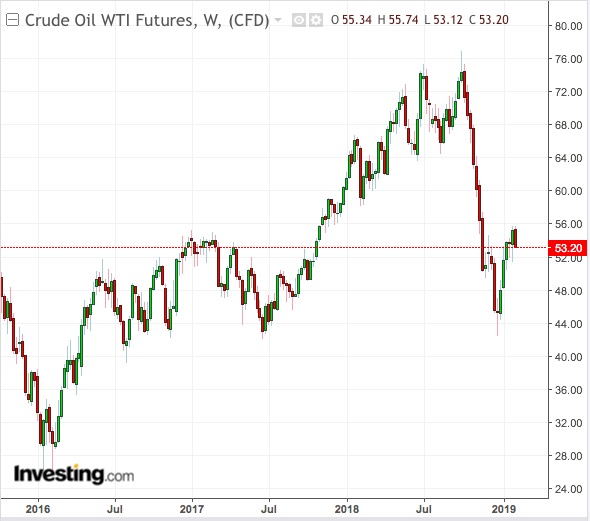For the second time in a year, Saudi Arabia is reportedly persuading Russia to enter a formal pact with OPEC to control global crude exports and prices. Once again, Moscow may stall and eventually dismiss the idea, which appears to benefit Saudi interests more than its own and could damage the competitiveness of Russia’s oil industry over the longer-term.
To thwart the double threat of cheap gushing U.S. shale oil and President Donald Trump’s pressure on OPEC as well as to keep its prices low, Riyadh and its Persian Gulf allies are backing a formal partnership with a 10-nation group of oil producers led by Russia, the Wall Street Journal reported on Tuesday.

The so-called OPEC+10 alliance has succeeded twice in the past three years in bringing oil prices back from multi-year lows: the first in 2016, when U.S. West Texas Intermediate fell to nearly $25 barrel, and the other since December, when it tanked below $43. This week, WTI shot back above $55.
In both market busts, oversupply of shale was primarily responsible, though last year’s crash was also contributed to by Trump, who issued unexpected waivers on Iranian oil sanctions to add to global supplies, then worsened the damage by tweeting that OPEC shouldn’t try and boost prices. And both times, it was Russia that finally helped rescue the market by joining the Saudis in cutting production.
Saudis Seeking Lasting Fix For Shale, Trump Woes
Eager to find a long-term, if not permanent, fix to the shale and Trump problems, the Saudi-led Organization of the Petroleum Exporting Countries would propose and debate at its next meeting in Vienna—next on February 18—a formal OPEC+10 arrangement that proactively works to keep prices supported at all times, rather than just react to market crashes.
If accepted at OPEC level, the draft plan could evolve into a final deal when the cartel meets with the +10 group in April, the WSJ said.
The paper added that a Russian energy ministry spokeswoman didn’t respond to a request for comment. There’s probably a good reason why. The current plan is a watered-down version of an earlier gambit by Riyadh in June 2018 to create a new OPEC-like structure with Saudi Arabia and Russia as omnipotent members. After six months of chewing on it, Moscow rejected that idea.
To understand why Russia isn’t hot about belonging to an oil cartel—despite its collaboration with OPEC—one has to understand what drives its oil industry. Like OPEC’s 14 members, Russia has a national oil company, Rosneft, and an energy minister, Alexander Novak. But it also has privately-owned multinational energy firms such as Lukoil that operate on a commercial basis and grow by competing for customers.
In a weak market, commercial oil companies will attempt to sell more barrels at a lower price rather than try to sell less at a higher one. In other words, they are no different than the U.S. shale operators. Only state-owned oil companies play for a constrained supply game, and the Saudis lead the OPEC playbook on this.
Given the similarity between their operating ethos and that of the shale industry, the Russians are probably aware that the U.S. competition can't be blunted despite the best efforts of OPEC. U.S. oil production keeps growing, its crude exports keep expanding and new pipelines to carry oil within and outside the country are being added and expedited.
The U.S. Energy Information Administration says that by 2025 the U.S. could produce more oil and liquids than Russia and Saudi Arabia combined.
Russians Aware Of Saudi Game
John Kilduff, founding partner at New York energy hedge fund Again Capital, likened the idea of tying Russia down to OPEC rules as “leading a horse to water, but not being able to make it drink.”
To make his point, Kilduff cited Russia’s procrastination before agreeing to the current collaboration on production cuts between the +10 group of oil producers it leads and OPEC. He added:
“The Russians know that when they are forced to proactively keep their supplies tight at all times to support prices, they are only going to foster more barrels from other competitors who aren’t playing by such rules.”
And while the Saudis have absorbed most of the cuts in the latest OPEC+10 efforts to balance the market, Kilduff also sees that as an effective ruse to drive home the “higher prices benefit all” notion to cover Riyadh's need to protect its market share, particularly in lucrative Asia.
Added Kilduff:
“We keep hearing that the Saudis are cutting their heavy crude exports to the U.S. What we hear less of is how hard they are fighting to keep the barrels of light they sell to Asia, the same kind of oil that U.S. shale can compete with."
“The Asian market is where the Saudis make their most money and they don’t want to lose that golden goose. They are afraid of U.S. crude eating into that market share. From China to Korea, Japan and India, the Asians have proven to be willing buyers across of the board of U.S. shale."
"By getting the Russians to reduce their light crude exports under global cuts, the Saudis are also getting help to preserve their Asian market share. Last but not least, the Saudis need oil to be above $80 per barrel. The Russians can do with just above $40. They don’t need OPEC.”
'Bring On The President!'
So what could happen to the Saudi plan for a formal OPEC+10?
The Russians, in a face-saving gesture, could agree in principle to consider the idea, without a definitive timeplan.
In the meantime, the informal alliance could show Trump that it is fighting against his tweets more resolutely.
Said Phil Flynn, analyst at The Price Futures Group brokerage in Chicago: “Bring on the President. OPEC and Russia may make it official!”
